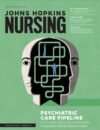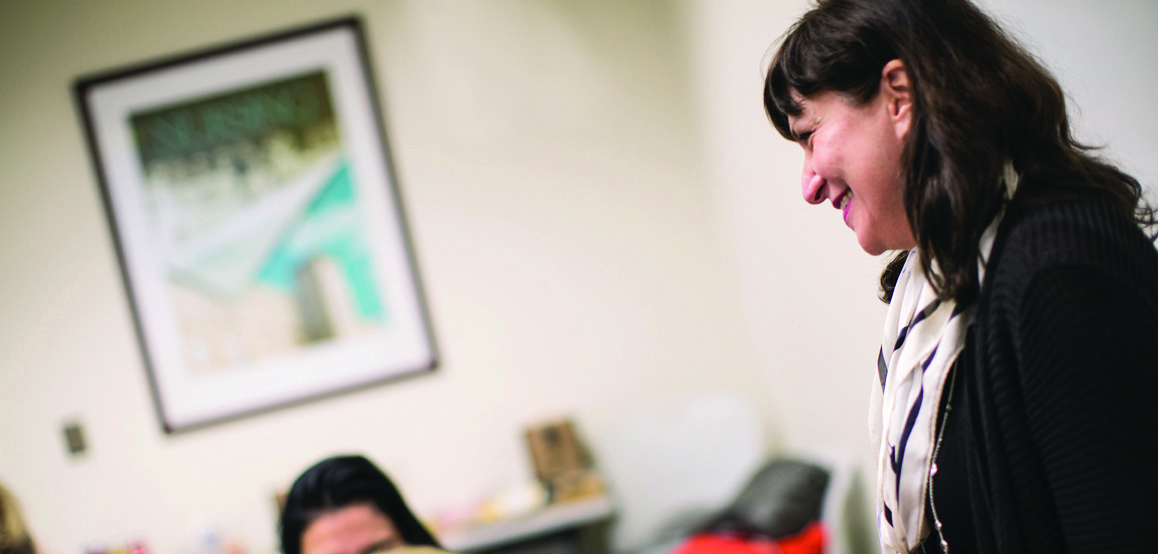Change agent Laura Gitlin develops powerful partnerships in care for the aging
Professor Laura N. Gitlin, PhD, sees no reason to stick to the tried and (perhaps not always) true in geriatric care.
She is an international leader on treatments that engage rather than simply sedate dementia patients who exhibit troubling behavioral symptoms, a sea change for healthcare if not a revolution. She has a well-received massive open online course, or MOOC, under her belt (with colleague Nancy Hodgson, PhD, RN). And her team at the Johns Hopkins School of Nursing is called the Center for Innovative Care in Aging, after all.
So the chance to help lead a groundbreaking John A. Hartford Foundation and Gerontological Society of America (GSA) initiative to build and nurture a network of geriatric-care innovators—called Hartford Change AGEnts—and enhance the standing of her School of Nursing (JHSON) center at the same time? This looks like the beginning of a beautiful partnership. “There’s a lot of important synergy,” Gitlin says.
The Change AGEnts Initiative will initially focus on bringing together “anyone affiliated with Hartford-funded projects to make real change in the way healthcare is delivered to older Americans,” according to the foundation. The expertise Gitlin has built with her own interprofessional research and practice teams will help to inform the initiative; in turn, the successes of the Change AGEnt networks will inform how best to make inroads in healthcare for older adults and their families. The initiative’s leadership team consists of the John A. Hartford Foundation, the GSA, the consulting firm Strategic Communications and Planning (SCP), former GSA President Nancy Whitelaw, PhD, and Gitlin, a GSA fellow. The Hartford Foundation’s $5 million grant funded the initiative. Asked what the association means for her, Gitlin explains that it will allow her to “look at practice change from yet a different angle.”
At JHSON, she leads a team of occupational therapists seeking ways to treat dementia-related behaviors like physical or verbal aggression without drugs. The team has shown that teaching families to introduce such activities such as crafts, puzzles, exercise, and music that match a patient’s interests and capabilities can reduce agitation in patients and offer caregivers time to themselves. In addition to a National Institute on Aging-funded trial in Baltimore, this approach is being tested in a Hopkins Hospital unit, through the Veterans Administration in Florida, and in Kentucky, Texas, Australia, Scotland, and Brazil.
A recent MOOC (Care of Elders With Alzheimer’s Disease and Other Major Neurocognitive Disorders) by Gitlin and Hodgson reached more than 25,000 individuals from 140-plus countries and sought to provide a comprehensive understanding of dementia and its impact on patients, families, and caregivers.
In addition to her work on dementia treatment, Gitlin, who joined JHSON in 2011 from Thomas Jefferson University in Philadelphia, also has developed and tested interventions that ease depression among elderly African Americans and improve daily function of physically frail older adults. And she is preparing the third Summer Research Institute, which helps researchers and health professionals from any discipline move their behavioral intervention projects toward the trial and grant stages (see neighboring article).
“I’m an applied sociologist,” Gitlin explains. “I bring to healthcare a social-ecological perspective that views the health of older adults and their families within the context of their everyday lives. Hartford Change AGEnts was an opportunity for me to learn and think through new ways of changing the practice of health and human services for older adults and their families, and that’s ultimately what I’m interested in.”
The SRI Success Story
With the third installment of the Center for Innovative Care in Aging’s Summer Research Institute set for June 11-13 at the Johns Hopkins School of Nursing, Laura N. Gitlin, PhD, was asked to describe what success has looked like so far for the program.
Her answer: “real.”
The researcher then pulled a binder from a shelf. It held the titles of projects SRI participants had been engaged in. “Just looking at the titles gives you a real-life sense of what people are really working on,” Gitlin explains.
“They’re working on critical social and health problems that real older adults, their families, and communities face. They are proposing novel strategies for solving them.”
SRI is meant to foster interventions that have the potential for “real impact on real people,” says Gitlin, a national expert on home- and community-based non-pharmacological interventions. For over 27 years, she and her team have developed, tested, and implemented a wide range of interventions that address depression in older African Americans, functional disabilities in frail older adults, behavioral symptoms and functional decline in persons with dementia, and family caregiver distress.
Participants in SRI have included junior faculty, post-doctoral students, researchers, or investigators with limited experience in health-related behavioral intervention research. Most have an idea for an intervention and have previously engaged in solid research but “now they are not sure how to build an intervention and put it all into play,” Gitlin says. “They leave the SRI with a concrete plan for taking their interventions forward by either writing a grant application or refining their study designs.”
The program offers participants hands-on, practical knowledge and skills, according to Gitlin. Those who complete it learn to identify strategies for enhancing and measuring treatment fidelity, advancing an intervention protocol and a trial design, involving community and practice-based partners, and writing a grant proposal.
“We hear from alumni of the program that their participation is having a strong impact on their research careers,” Gitlin says. Participants “have advanced their interventions, submitted for or have been awarded grants including K Awards from the National Institutes of Health, and they are developing manuscripts and testing their interventions. They are all advancing.”
(Gitlin and colleagues will take the SRI on the road in August, offering it in as a weeklong course in Basel, Switzerland.)
In the U.S. version, registrants from within Johns Hopkins University are eligible for tuition remission. Fellowships for investigators in nursing are also available as part of a mentorship program awarded to the Center for Innovative Care in Aging from the John A. Hartford Foundation. Learn more at nursing.jhu.edu/aginginstitute.
Photography by Chris Hartlove

